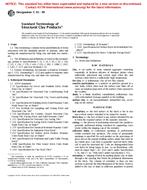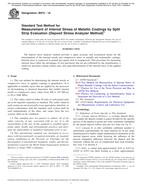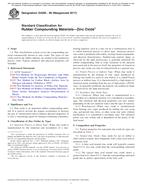1.1 This practice covers various electrical discharge treatments to be used to enhance the ability of polymeric substrates to be adhesively bonded. This practice does not include additional information on the preparation of test specimens or testing conditions as they are covered in the various ASTM test methods or specifications for specific materials.
1.2 The types of discharge phenomena that are used for surface modification of polymers fit into the general category of nonequilibrium or non-thermal discharges in which electron temperature (mean energy) greatly exceeds the gas temperature.
1.3 The technologies included in this practice are:
| Technology | Section |
|---|---|
| Gas plasma at reduced pressure | 8 |
| Electrical discharges at atmospheric pressure | 9 |
| AC dielectric barrier discharge | 9.1 |
| High Frequency Apparatus | 9.1.1 |
| Suppressed Spark Apparatus | 9.1.2 |
| Arc Plasma Apparatus | 9.2 |
| Glow Discharge Apparatus | 9.3 |
Note 1 – The term “corona treatment“ has been applied sometimes in the literature to the different electrical discharge treatment technologies described in Section 9. This practice defines each electrical discharge treatment technology at atmospheric pressure presented in Section 9 and draws the necessary distinctions between them and corona discharge. See Test Method D1868 for “corona discharge.“
1.4 The values stated in SI units are to be regarded as the standard.
1.5 This standard does not purport to address all of the safety concerns, if any, associated with its use. It is the responsibility of the user of this standard to establish appropriate safety and health practices and determine the applicability of regulatory limitations prior to use. Specific hazard statements appear in Section 6.
Product Details
- Published:
- 05/01/2012
- Number of Pages:
- 5
- File Size:
- 1 file , 82 KB


